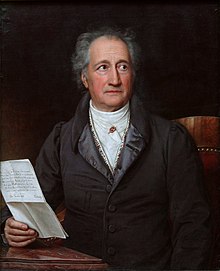
"The purpose of this novel was to show how the unmanageable and invincible is often better restrained by love and pious feeling than force." So said the revered German writer Johann Wolfgang von Goethe in his "Novelle," which he published in 1828. The "Novelle" is considered to be Goethe's initial foray into constructing a moral narrative, that is, a narrative intended to make a moral point. Rather than constructing a story with no real point, as many novels published in the twentieth-first century often do, Goethe used the "Novelle" to demonstrate that narrative can be used in ways that transcend plot. Indeed, the plot is often the moral.
This notwithstanding, in offering these lines, Goethe is suggesting that, broadly speaking, we can often deal with what seems insuperable or ummanageable in ways beyond brute force. That it is love which, in the way that love tends to transcend our arrogant human pride and selfishness, often in a manner we cannot readily comprehend, wins the day. Yes, wars are often won through overwhelming military force. However, overwhelming military force cannot change the human heart. For it is the heart in which we find who we most are: force has no traction when piety and love confront it. Though militarily speaking force may win, it really does not.
For if love is not the greatest thing, and if love does not prevail, we are merely spinning our wheels in this complex game we call life. What otherwise is the point?
No comments:
Post a Comment